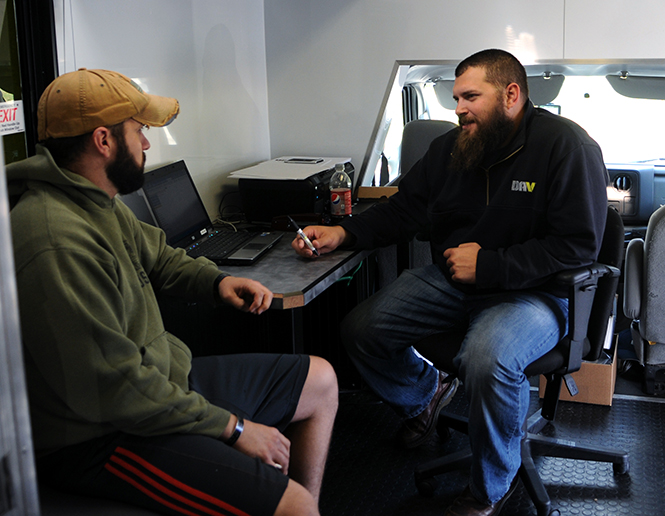Mobile office provides information, assistance to student, community veterans
Matt Deibel (left) and Steven Strodtbeck (right) sit at the office the DAV has established in a mobile unit on Tuesday Oct. 22, 2013. The DAV mobile unit travels around Ohio helping veterans file disability claims for injuries obtained while in the service. Currently the mobile unit has been traveling to Ohio college campuses assisting veterans serving post-9/11 with any questions they might have regarding benefits they are entitled to or how to file disability claims. Photo by Rachael Le Goubin.
October 23, 2013
The Disabled American Veterans Mobile Office stopped its caravan outside of the Michael Schwartz Center on Tuesday from 10 a.m. to 5 p.m. to provide counsel (to young veterans) and filing assistance for benefit programs.
The disabled veterans organization was created by Judge Robert Marx in 1920 and consists of 1.2 million members. The Mobile Service Office program is a nonprofit organization dedicated to the service of the nation’s injured heroes.
The service, free of charge, is available to veterans in school and veterans who are interested in learning about different benefits. This is the organization’s first time traveling to universities across the country while helping young veterans develop and file claims for compensation.
“The Mobile Service Office provides a great opportunity for these veterans (on campus) and veterans in the community to learn about their benefits,” said Joshua Rider, assistant director of Kent State’s Center for Adult and Veteran Services.
Rider said one of the main focal points of the program is to reach one of the 647 GI Bill recipients on campus. These recipients are recently discharged veterans using the benefits of the Post-9/11 GI Bill.
The Post-9/11 GI Bill, which was passed in 2008, created a variety of new education benefits programs for veterans, Rider said. The coverage from the bill is based on a tiered system that measures the time spent in active duty. Some facets of the bill include tuition provisions, monthly living stipends and allowances for books and supplies.
Mike Brady, a national service officer for the Disabled American Veterans Mobile Office, said the office doesn’t only want to help with GI Bill benefits but also other conditions such as post-traumatic stress disorder, homelessness, veterans injured from natural disasters and the transition back to civilian life.
“They don’t realize what benefits are out there and what we can do for them,” Brady said. “That’s what we are here for; they might be eligible for something they don’t know about.”
Because this is the office’s first time traveling to Kent and with the lack of proper advertising, only a dozen veterans visited the office throughout the day.
However, this isn’t a set back; it’s only the beginning. The mobile office will be back sometime during the spring semester.
“It’s a little disappointing today. We thought we would get more veterans, but that doesn’t mean we are gong to stop trying,” Brady said. “It’s only the tip of the iceberg, and we will be back in 2014.”
Veterans who stopped at the mobile office were ecstatic about the office’s willingness to help.
“I thought it was great they were here today,” said Jon Hitchcock, a veteran of the War on Terror. “I received multiple injuries over there (in Iraq and Afghanistan) and what they were able to do for me was amazing. I never knew I was eligible for compensation.”
Contact Chase Bonhotel at [email protected].

























